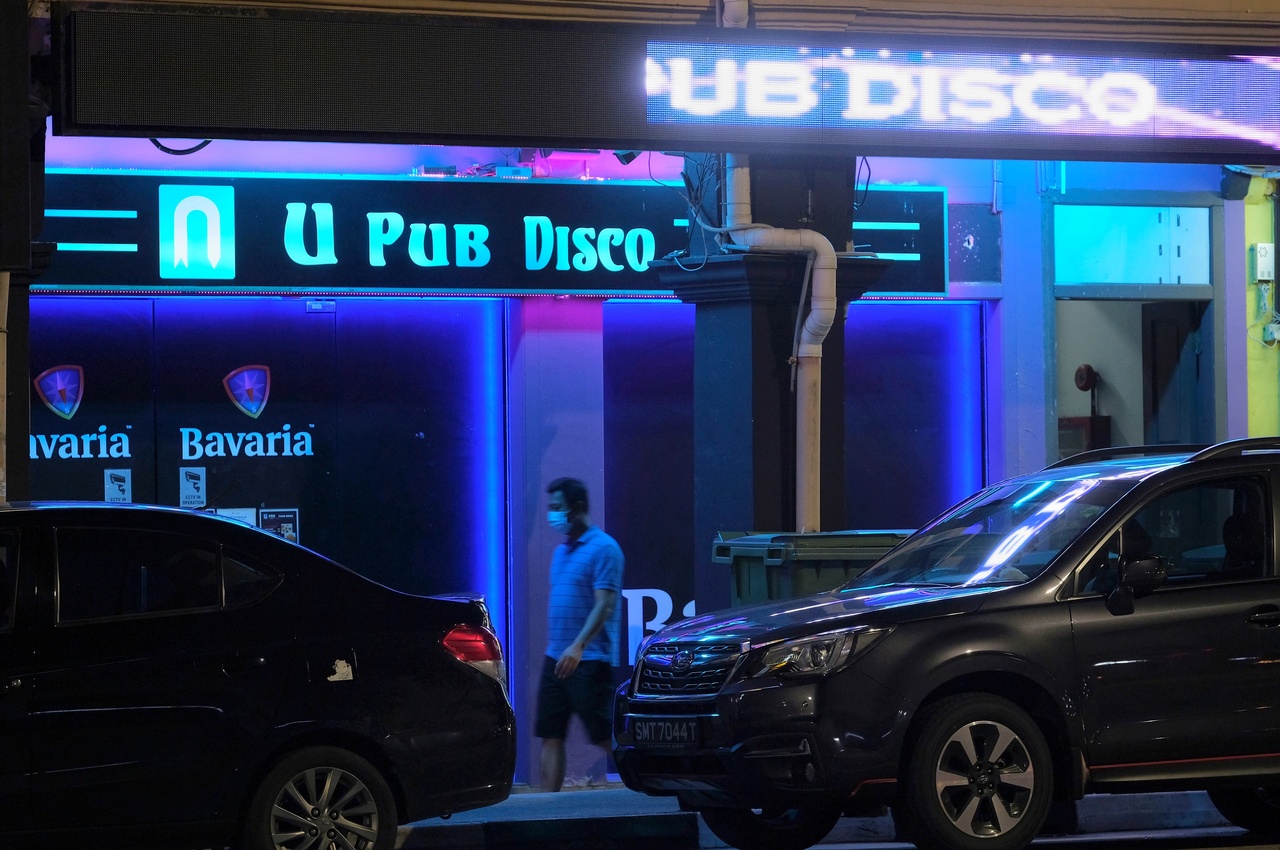One police operation per day on average against errant nightlife outlets since October: Shanmugam
Sign up now: Get ST's newsletters delivered to your inbox

U Pub in Geylang Road was among the pivoted KTV lounges that had possibly breached safe management measures.
ST PHOTO: GAVIN FOO
SINGAPORE - The authorities have conducted continuous enforcement against unlicensed nightlife operators as well as outlets issued grants to pivot to selling food and beverage, with an average of one police operation every day from October 2020 to July 2021, said Law and Home Affairs Minister K. Shanmugam on Monday (July 26).
He told Parliament that offenders have been dealt with severely and that these operations will continue.
A KTV Covid-19 cluster uncovered on July 12, which has since grown to more than 230 cases, has been linked to an outbreak at Jurong Fishery Port.
With over 790 infections as at Sunday, the Jurong Fishery Port cluster is now Singapore's largest community cluster, and led to the Government reverting last week to a set of tougher curbs which have impacted many businesses, including those in the nightlife industry.
On Monday, Mr Shanmugam said in Parliament that from October 2020 to July 2021, the Police had conducted 202 operations against outlets which had pivoted or were operating illegally.
"So we had one police operation - every single day, on average - since October 2020," said Mr Shanmugam. "So this should put to rest any questions about enforcement actions by the police: one operation, every day."
He was asked later by Leader of the Opposition and Workers' Party chief Pritam Singh if this was a heightened enforcement regime. Mr Shanmugam replied: "I think we can assume that if there was one enforcement action per day, it's quite intense... And this is quite apart from what safe distancing ambassadors and so on do."
These operations from October to July led to the detection of 58 infringements under the Public Entertainment Act and Liquor Control Act, 595 breaches of Covid-19 safe management measures and 142 arrests for offences under various related laws, including the Employment of Foreign Manpower Act and Immigration Act.
These operations from October to July led to the detection of 58 infringements under the Public Entertainment Act and Liquor Control Act, 595 breaches of Covid-19 safe management measures and 142 arrests for offences under various related laws, including the Employment of Foreign Manpower Act and Immigration Act.
Mr Shanmugam added that since October last year, enforcement was also carried out over 20 weekends and on every festive occasion, with about 400 F&B outlets inspected in each operation.
Some 100 of these outlets, including 40 pivoted ones, have been ordered to close. As at July 23, the Singapore Food Agency has permanently revoked the food licences of seven pivoted outlets.
Mr Shanmugam acknowledged that the pandemic had badly affected an estimated 10,000 local workers in the nightlife industry, and that the Government's response had been to consider appeals and suggestions from stakeholders, and weigh the risks.
"Most people will accept it will be wrong to treat all the 430-odd businesses - KTV operators, pubs, bars which want to change to provide F&B - automatically as crooks," he said.
"Yes, the Government does know that there are some... with dodgy reputations. For some, if you look at their premises - darkened rooms, not the most optimal for dining - it appears commonsensical to say this is dodgy and doubtful."
"But in law, it's not so straightforward," Mr Shanmugam added, explaining that agencies would have to consult the Attorney-General's Chambers on whether they can reject an operator's application if they think it might be dodgy - even if the operator undertakes to comply with the conditions.
Once these issues are assessed, the Government will decide on whether a reopening can be allowed for pivoted nightlife outlets which have had their operations suspended since July 16.
" I will also say, realistically, the people who are going to cheat, going to do illegal things, will do them anyway... regardless of whether we allow the change to F&B," said Mr Shanmugam.
He was later asked by Ms Tin Pei Ling (MacPherson) if there was a risk that enforcement would drive these vice activities further underground. Mr Shanmugam said this was precisely the issue.
"The issue is that there is money to be made in making available (such) services, and there will always be people, because there is a huge demand, regardless of the rules. And there is... some supply," he said. "There will always be arbitraging opportunities (to) make money."
The authorities just have to keep at it, said Mr Shanmugam. "This is not going to stop. It's just a question of whether (there are) more or less of these activities."
He also stressed, as health minister Ong Ye Kung had in another ministerial statement on Monday, that the KTV cluster alone would not have triggered the latest round of tightened restrictions.
He also stressed, as health minister Ong Ye Kung had in another ministerial statement on Monday, that the KTV cluster alone would not have triggered the latest round of tightened restrictions.
The Jurong Fishery Port cluster, which has spread through the markets, hawkers, into the wider community, is the reason, said Mr Shanmugam.
"Some are under the misimpression that the virus went from the KTVs to the fishery port; the evidence we have doesn't suggest that," he said. "The virus seems to have come from the region to our port."
The Government is working on a safe reopening for pivoted nightlife outlets which have had their operations suspended since July 16, he added.


